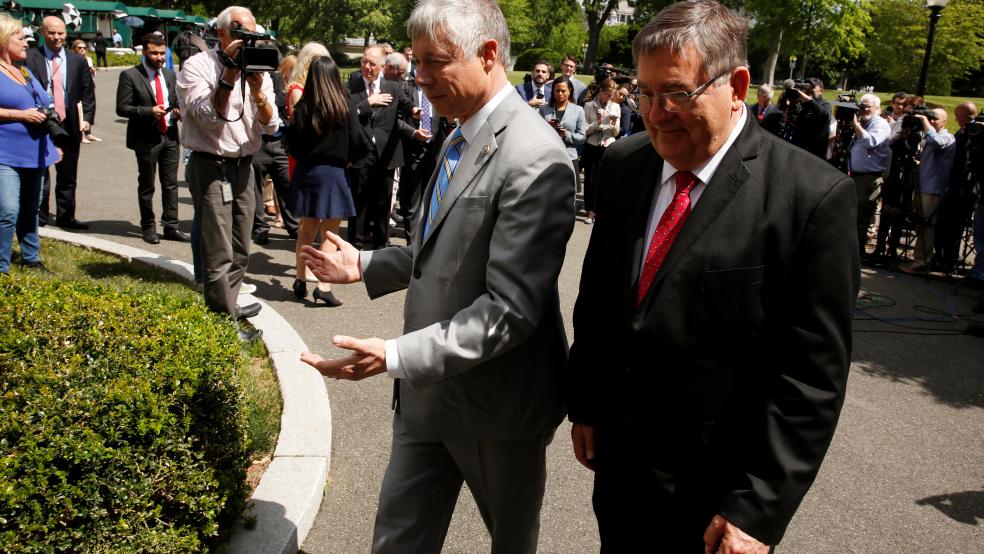The House Republicans’ flagging effort to repeal and replace the Affordable Care Act received a fresh burst of momentum on Wednesday, after a key moderate who had previously announced his opposition to the proposal changed his mind. Michigan Rep. Fred Upton said that House leadership had agreed to an amendment that allayed his concerns about the bill’s effects on people with pre-existing conditions.
Upton’s switch was a major reversal, because with 30 years in the House and a reputation as an expert on healthcare, he wields considerable influence with the members currently standing in the way of the American Health Care Plan’s package.
Related: The White House Fires a Warning Shot on Obamacare, but Are They Firing Blanks?
Upton had been troubled by the bill’s position on the treatment of people with pre-existing conditions. Under current law, insurance policies sold on health exchanges established by the ACA cannot charge sick people more than healthy people. The GOP bill would allow states to seek waivers to that requirement for people who go without insurance for more than two months. That provision worries GOP moderates who believe it would result in sick people either losing insurance or being forced into underfunded “high-risk pools.”
Upton’s amendment would add $8 billion over five years to the measure, money that he told the Associated Press would be used to help subsidize premium payments for sick people who find themselves being charged more under the AHCA. But health insurance experts said that they seriously doubted that the addition of $8 billion over five years would address the expected funding shortfall that the bill would create.
“This wouldn’t fill gap,” said Karen Pollitz, a senior fellow for health reform and private insurance at the Kaiser Family Foundation.
The total cost would depend on the number of states that accepted the waiver, she said, but as recently as 2011 there were 35 states trying to cover about 225,000 people through high-risk pools. They spent $1.2 billion per year, collectively, on plans that had waiting lists, and annual and lifetime coverage caps, and they still lost money.
Related: Republicans in Congress Don’t Want to Give Up Their Obamacare Benefits
Kaiser has estimated that as many as five million people currently covered under the Affordable Care Act have pre-existing conditions. “Even if only a fraction of them enter following a gap in coverage, the cost of high risk pools for them would be much higher,” Pollitz said.
For the time being, though, House Republican leaders are treating the Upton amendment as a possible turning point in their battle to get rid of the ACA.
In an appearance on the Hugh Hewitt radio program Wednesday morning, House Speaker Paul Ryan said, “Fred Upton identified something that he thinks will make the bill better, that is mutually agreed to by people from all parts of our Congress.” He said that the proposal has the approval of the chairman of the hard-right Freedom Caucus and expressed optimism that the GOP could find the votes to bring the bill to the floor.
“So what we’re doing is listening to our members, finding where that sweet spot of consensus is and driving there,” he said. Though he refused to commit to bringing the bill up for a vote until he knows that it will pass, he told Hewitt he believes they are “very, very close” and added, “I feel very good about the progress we’re making.”
Related: Why Trump May Be Better Off With Another Obamacare Repeal Failure
What is unclear is whether the addition of more money to the bill, earmarked for subsidizing individuals’ premiums, will change enough moderate votes to pass the bill without alienating the hard-right element in the GOP conference that killed an earlier version of the bill.
President Trump is known to be eager to get an ACA replacement bill signed into law, and will be meeting with key lawmakers, including Upton, Wednesday.
Early in the day, White House Office of Management and Budget Director Mick Mulvaney sent a signal about what the administration would like to see happen, even if the bill’s support might not be ironclad. He advised Ryan to roll the dice.
“I think it's really, really close,” Mulvaney said in an appearance on Fox & Friends. “If I were the speaker of the House...I’d probably go to the floor, because it’s just that close.”





